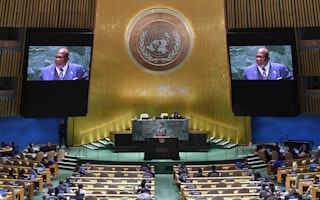A combination of multiple shocks—including the COVID-19 pandemic and Russia’s full-scale invasion of Ukraine—has left a range of low- and middle-income countries struggling under the weight of their indebtedness.
Yet the existing global debt architecture has not risen to meet the challenge. Several countries—including Zambia—have faced seemingly interminable delays in renegotiating with their creditors, even as they comply with all requirements set by the International Monetary Fund.
The system set up to help streamline restructuring has instead resulted in confusion, delays, and, ultimately, very real human costs in borrower countries.
At this event hosted by Sciences Po’s Chair in Sovereign Debt, the Open Society Foundations will launch a new policy brief that highlights the human costs of delaying a debt restructuring.
Speakers
-
Arancha Gonzalés
Speaker
Arancha Gonzalés is dean of the Paris School of International Affairs at Sciences Po.
-
Mark Malloch-Brown
Speaker
Until June 2024, Mark Malloch-Brown was president of the Open Society Foundations.
-
Ceyla Pazarbasioglu
Speaker
Ceyla Pazarbasioglu is director of the Strategy, Policy, and Review Department of the International Monetary Fund.
-
-
Clemens Graf von Luckner
Speaker
Clement Graf von Luckner is a PhD student at Sciences Po Paris and an economist in the World Bank Chief Economist Office, focusing on the economics of debt and default.
-
Faides TembaTemba
Speaker
Faides TembaTemba is executive director of Civil Society for Poverty Reduction.
Read more
Global Tax Justice
UN Moves Toward a Global Treaty on Tax

By endorsing a resolution to create a UN treaty on international tax cooperation, developing nations are pushing to address the inequities of a flawed system dominated by the economic interests of the world’s richest countries.
Food Security
This Store in Lebanon Sells Hope

According to the UN, nearly two million people in Lebanon face food insecurity. A local grocery shop is pioneering a new model of social assistance to help engage the community, feed the hungry, and make shopping more affordable and accessible for all.
Spatial Justice
Building a Better Tomorrow in Beirut

Civil and regional wars, corruption and the 2020 blast have taken a devastating toll on Beirut. But the Beirut Urban Lab combines architecture and social justice to aid the recovery, advancing more just, inclusive, and sustainable cities.